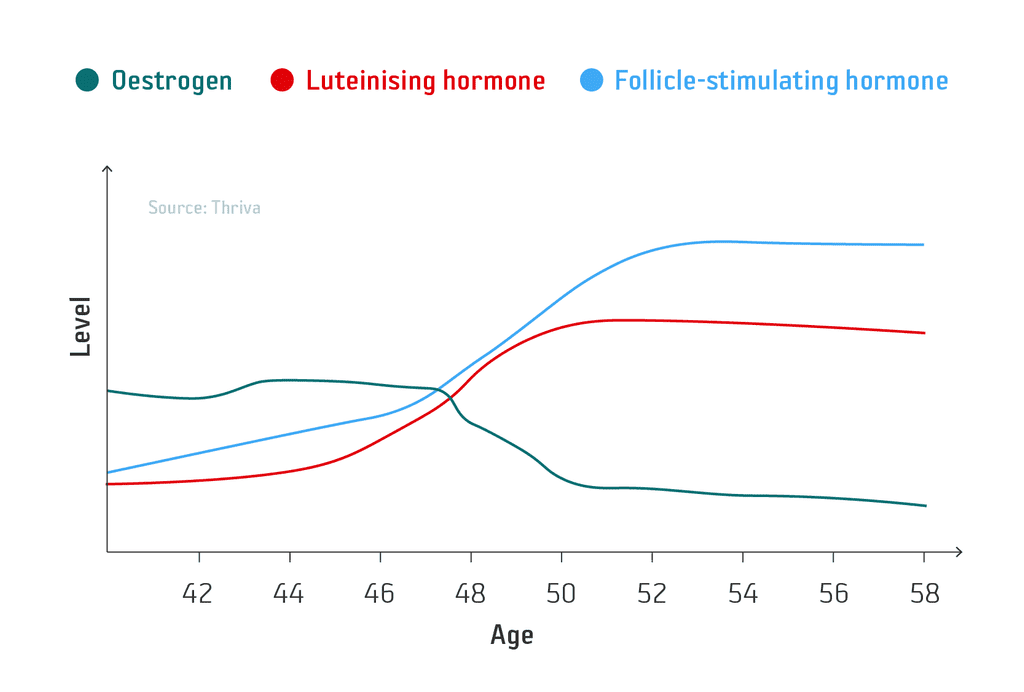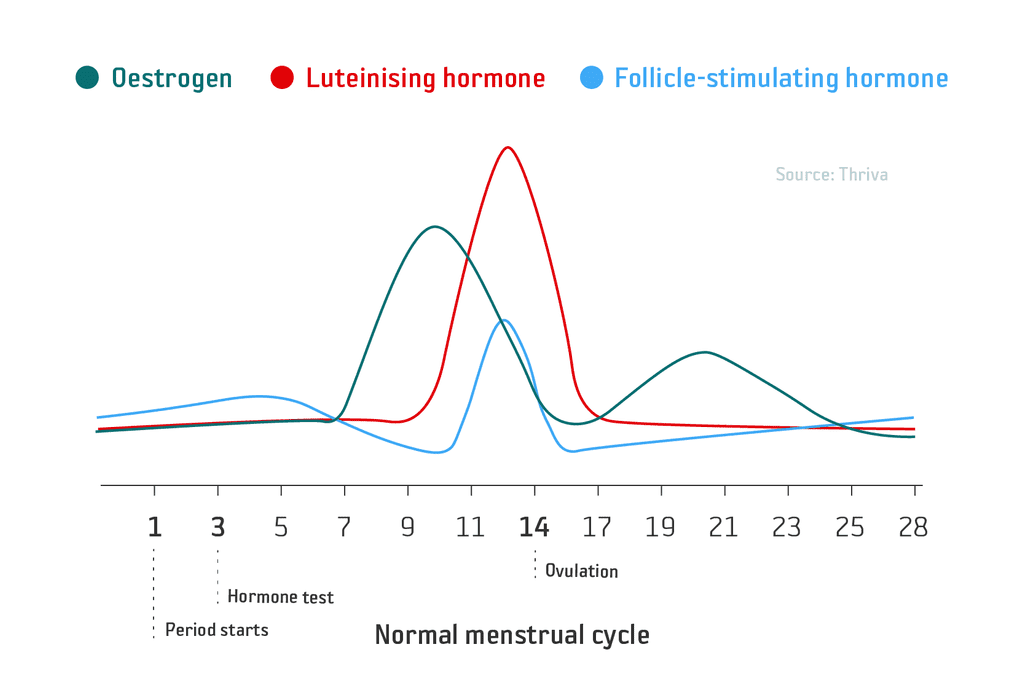
Which blood tests should I take?
The information presented here does not constitute medical advice, and is not intended to be a substitute for a consultation with your medical doctor.
You're convinced that regular blood testing can give you a better picture of your wellness and health. You're ready to head to the lab.
But which of the thousands of tests should you get?
The basic routine blood work during your yearly check-up is a good first step, but it will only help identify markers related to certain serious diseases.
Blood tests have benefits that go far beyond disease prevention, and by monitoring levels of essential nutrients, pollutants, and sex hormones, you can take active steps to enhance your quality of life.
But first:
What is a biomarker?
All of you are probably familiar with symptoms. For example, when you get the flu, you may experience a sore throat, cough, loss of appetite, fever, and exhaustion.
A symptom is defined as “a departure from normal function or feeling which is noticed by a patient, reflecting the presence of an unusual state, or of a disease”. It is subjective, observed by the patient, and cannot be measured directly.
You may have also overhead a doctor talk about your signs. These are similar to symptoms, but can be objectively observed by others.
If you feel a tingling feeling, that is symptom, but if your skin is observably redder than usual, you've got a sign.
Biomarkers are defined by the World Health Organization as “any substance, structure, or process that can be measured in the body or its products and influence or predict the incidence of outcome or disease”, and they are the the most objective, quantifiable medical signs modern laboratory science allows us to measure.
But what's particularly interesting about biomarkers, is that they can reveal an increased risk of diseases before there are any visually observable signs or felt symptoms.
Biomarkers let you predict that you are moving towards a disease, and give you the opportunity to act on it before you actually get sick.
For example, a number of tests can be used to tell if you has early signs or a high risk of heart disease, diabetes and other situations.
The basic tests you should do every year
Complete Blood Count (CBC) and Comprehensive Metabolic Panel (CMP)
These are two blood tests commonly ordered at a primary care yearly physical.
They are essential to understanding your electrolyte and hydration status, kidney function, liver function and blood cell values. These tests can also indicate metabolic diseases, acute or chronic infections, anemia and clotting issues.
The CBC usually includes:
- White blood cell count (WBCs) — the number of white blood cells per microliter of blood
- Red blood cell count (RBCs) — the number of red blood cells per microliter of blood
- Hemoglobin (Hgb) — how many grams of this oxygen-carrying protein per deciliter of blood
- Hematocrit (Hct) — the fraction of blood that is made up of red blood cells
- Mean corpuscular volume (MCV) — the average size of red blood cells
- Platelet count (Plts) — how many platelets (a smaller cell involved in clotting blood) per microliter of blood
Note that hemoglobin levels increase with altitude and reference ranges must therefore be corrected if you live in a high altitude area.
The Metabolic Panel (also known as the Electrolyte Panel) includes what is sometimes called the chem-7:
- Sodium
- Potassium
- Chloride
- Carbon dioxide (CO2) — sometimes referred to as Bicarbonate, a chemical form of carbon dioxide which is more common in blood
- Blood urea nitrogen (BUN)
- Creatinine — often accompanied by an estimated Glomerular Filtration Rate (eGFR)
- Glucose
Metabolic markers — HbA1c, cholesterol, triglycerides
Metabolic markers are essential to understanding how you process the macronutrients you eat, and elevations in any of these levels is a sign that your body is not processing glucose properly, which can increase your risk for diabetes, heart disease, cancer, and Alzheimer’s disease.
The HbA1c (glycated haemoglobin) measures your average blood glucose (sugar) level over the past 90 days. This indicates your risk for pre-diabetes and diabetes, but it is also a relative marker of oxidation in the body. Having elevated blood glucose levels creates oxidation, or damage to proteins, DNA, and bodily tissues over time, so it’s an important value to know and optimize.
A lipid profile then measures the Total Cholesterol and Triglycerides, as well as the levels of 'good' HDL and 'bad' LDL Cholesterol in your blood. The balance of good and bad cholesterol can help determine your risk of developing heart disease or stroke.
Essential nutrients — Iron/Ferritin, Vitamin D (25-Hydroxy), Vitamin B12, Magnesium
Iron, Vitamin D, Vitamin B12, and Magnesium are crucial for optimal bodily function, but they’re not commonly checked during routine checkups.
Many people are deficient in these nutrients for various reasons. For example, endurance athletes are particularly susceptible to iron deficiency, especially menstruating women and anyone who trains at altitudes.
For example, Vitamin D deficiency is extremely common in northern countries due to a reduced exposure to sunlight, and is the cause behind the seasonal affective disorder (SAD), commonly known as the winter blues.
It is imperative that you track the levels of these essential nutrients and supplementation when any of them are below optimal can be life-altering.
Thyroid panel
Issues with your thyroid can cause hormonal imbalances leading to a wide range of symptoms including extreme tiredness, anxiety, depression and weight gain or loss.
Measuring thyroid hormones (TSH, Free T4) and the four additional markers — Free T3, Total T4, Anti-Thyroid Peroxidase antibodies (TPOAb) and Anti-Thyroglobulin antibodies (TGAB) — can tell you if your symptoms might be due to a thyroid disorder, like an overactive or underactive thyroid (hyperthyroidism or hypothyroidism).
Inflammatory markers — hs-CRP, Homocysteine
Inflammation is part of the body's immune response. Infections and wounds would not be able to heal without it.
Chronic inflammation, however, can eventually cause severe diseases and conditions, including some cancers and rheumatoid arthritis.
hs-CRP (high-sensitivity C-reactive protein) is a general marker which can tell that there is an inflammatory process happening in the body, whether it be from physical trauma, emotional stress, oxidative stress, environmental toxicity, allergy, sedentary lifestyle, or food sensitivities. Even mild increases in hs-CRP are associated with increased risk of cardiac events and depression.
Homocysteine is an amino acid that requires methylated-Vitamin B12 and Vitamin B9 (Folate) to be cleared. Elevated levels of homocysteine have been associated with increased risk of heart attack, bone fracture, and poor cognitive function.
Advanced hormone and nutrient tests
Cortisol (stress hormone)
Cortisol is a hormone that helps you cope with stress, control blood sugar, regulate blood pressure, and convert food to energy.
High cortisol levels can cause a wide range of issues, including weight gain, tiredness, acne, thinning hair, low sex drive, anxiety, depression, irregular periods, and getting sick often.
A common cause for heightened cortisol levels is chronic stress, but they can also be a side-effect of tumors and certain medications.
Low cortisol levels, on the other hand, can be a sign of Addison’s and adrenal insufficiency-related diseases.
Your cortisol levels fluctuate throughout the day, starting at their highest in the morning and gradually dropping towards the night. With a saliva test, you can collect multiple samples over the course of one day to see if you follow the normal daily pattern.
Testosterone
Testosterone is an androgen (sex hormone) produced by both men and women. Men produce it in much higher amounts, but levels naturally drop as men age. Other factors, like kidney disease, liver disease, alcoholism and being overweight can also cause Testosterone levels to drop.
Men with low Testosterone might feel tired, have a low sex drive, gain weight, feel depressed and have low self-esteem. Women might also experience these symptoms but it's harder to detect low Testosterone as women's hormones fluctuate a lot.
Progesterone
Progesterone is a hormone made by a ovaries in a female, or a adrenal glands and testes in a male. It plays an important role in ovulation and pregnancy.
For men, symptoms of low levels of Progesterone include hair loss, low libido, weight gain, fatigue, depression, gynecomastia (breast development in males), erectile dysfunction, impotence, bone loss and muscle loss.
Vitamin K2
Vitamin K2 is a nutrient that works with Vitamin D, and is essential for proper calcium management. Unless you regularly consume fermented products such as Japanese natto, or German sauerkraut, there is a good chance you’re deficient and would benefit from supplementation.
Female hormone tests
There are a number of tests measuring female hormones which can give you an insight into your reproductive health and general wellness.
Menopause test
Measuring the levels of Follicle-stimulating hormone (FSH), Luteinising hormone (LH), Estradiol (E2) amd Sex hormone-binding globulin (SHBG) can tell if your hormones are in the menopausal range.

If your periods have stopped you can do your test at any time. If you still have periods, you need to do your test on day 3 of your period.
You may want to retest your FSH levels 4-6 weeks later, since they can fluctuate a lot leading up to menopause.
Hormonal disbalance test
Measuring the levels of Follicle-stimulating hormone (FSH), Luteinising hormone (LH), Estradiol (E2), Sex hormone-binding globulin (SHBG) and Testosterone can help you understand if things like acne, mood problems, low energy, irregular periods, and weight gain are caused by a hormonal disbalance.

These tests can also tell if you have the Polycystic ovary syndrome (PCOS), and help you understand why you might be having trouble getting pregnant.
Note that your results will be skewed if you are on any kind of hormonal contraception or medication, and the tests will not suitable if you are pregnant.
Tests for toxic trace minerals and heavy metals
High levels of trace minerals and heavy metals can occur with dietary intake, occupational exposure and medical conditions that reduce the body's ability to excrete them at a normal rate.
Examples of toxins include high levels of minerals such as chromium, iodine, manganese, iron, copper, molybdenum, zinc and selenium; and heavy metals such as mercury, lead, cadmium, chromium and arsenic.
High concentrations of pollutants in the body can cause organ failure, reduce the body's ability to manufacture new blood cells and increase the risk of developing cancer.
For instance, trichloroethylene, a solvent used in refrigerators, has been found to trigger an autoimmune response and compromise the gut microbiome; mercury has been found to trigger lupus; and certain pesticides have been found to cause lupus and rheumatoid arthritis, to name just a few.
Symptoms can often be mistaken for common illness, and include chills, dizziness, headache and general tiredness.

For example, you may want to do a mercury blood or urine test if you regularly consume large predatory fish such as shark, swordfish, king mackerel and tilefish, as they commonly have increased mercury levels.
Blood tests for vegans and vegetarians
A vegetarian, and particularly a vegan diet can be great for animals, the planet, and your body, but getting all the essential nutrients can be a challenge.
Vitamin B12
There is no plant-based source of B12, so it’s critical for vegans to supplement. Even if you continue to eat fish, or animal products such as milk and eggs, it is best to keep an eye on this Vitamin to make sure that you are not deficient.
Methylmalonic Acid, Serum (MMA)
The standard Vitamin B12 test does not distinguish between Vitamin B12 and its inactive analogues.
For example, as seaweeds contain a variety of inactive B12 analogues, someone consuming it regularly may have serum B12 levels in the normal range, but much of it could be inactive B12 analogues that may actually interfere with B12 function.
Because the biochemical pathway that reduces MMA levels in the blood uses only Vitamin B12, lowering MMA levels is a better test that is specific for B12 activity.
Omega-3 Index
For vegans and vegetarians who don’t eat fish, Omega-3 fatty acids DHA and EPA can be very difficult to absorb in adequate amounts and usually require supplementation.
Zinc, Selenium, Iodine
These three essential nutrients can be derived from plants, but can be difficult to find or absorb in sufficient quantities, thus sometimes requiring supplementation.
You can increase your levels of Iodine by consuming iodised salt, dulse, wakame, nori, kelp and other iodine-rich sea vegetables.
Iron/Ferritin
There are two types of iron: heme and non-heme. Heme iron is found in animal products and is generally easier for the body to absorb. Non-heme iron in found in vegan foods and is not as easily absorbed.
Although most vegans and vegetarians eating a balanced diet are not deficient, if you do have an iron deficiency, it is important to correct it as it can lead to dangerous levels of manganese being absorbed by the body.
You can can increase iron absorption by:
- Adding a source of vitamin C to your meals
- Avoiding tea and coffee around your meals
- Avoiding calcium supplements around your meals
- Increasing legume (peanuts, beans, lentils, peas) intake
- Cooking in cast iron skillets
Tests for sexually transmitted diseases
Most sexually transmitted diseases (STDs) can be diagnosed from a simple blood sample, including:
- chlamydia
- gonorrhea
- herpes
- syphilis
- HIV (1 month after infection)
The Centers for Disease Control and Prevention (CDC) recommends that all sexually active young adults (ages 15-24) get tested at least once a year for HIV, syphilis, chlamydia, and gonorrhea.
Regardless of age, if you are sexually active, it is important that you get tested for STDs on a regular basis.
Tests you may want to avoid
It is important to remember that all tests are imperfect, some more than others, and there is always a chance of a false positive — that is, of getting a diagnosis for a disease which you don't actually have.
Moreover, some of the treatments that can ensue from such a false positive can have their own, potentially serious, side-effects.
For example, let's look at the Prostate-Specific Antigen (PSA) blood test, which screens for prostate cancer.
Most men with a high PSA result don't have prostate cancer. Nevertheless, if your PSA is not normal, the step that usually follows is a biopsy.
The doctor will put a needle into the prostate to take samples for further analysis, a procedure which can be painful and lead to bleeding and serious infections.
And if the biopsy finds a cancerous cell, surgery or radiation are the usual treatments, both of which can cause serious complications such as heart attacks, blood clots and even death. In addition, many men become impotent as a result of the treatment.
You might think, erectile dysfunction must still be better than cancer!
But prostate cancer is in fact very common, and it is not always harmful. Many more men die with prostate cancer than because of it.
As a result, doctors commonly recommended against PSA testing for average-risk individuals, as it is likely to do more harm than good.
Similar dilemmas exist for other screening tests.
You should always consult with your doctor, as these tests may still be the right choice for you depending on your age, gender, family medical history and other factors.
